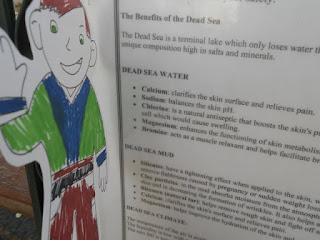I don't quite know how to describe it, but "visual democracy" is the phrase that keeps coming to mind. Multiple times I've had the sensation that Israel's democracy has a distinctly visual component. My experiences today reinforced that idea for me. Maybe the equivalent components in the U.S. are just more familiar to me and I take them for granted. Everything in this part of the world is still new and fascinating to me. As I walk down the street I notice the various states of dress and undress and what's being communicated. There's a guy with a head covering; those are a woman's eyes peeking out from yards of clothing; there's a guy in black with ringlets and a beard; there's a Muslim woman with her head covered; there's a Jewish woman with her head covered; there's an old guy with not nearly enough covered...all of these things mean something different. The signs are telling, but, especially in this area where geography is so contentious, the map definitely isn't the territory. There are so many more layers of complexity and uniqueness beyond the obvious distinctions.
Today's lesson in democracy came from a little trip to Nazareth. Did I go to Nazareth to visit locations of significance to different religions? Nope. Did I go to Nazareth to experience the second largest Arab community in Israel? Nope. Both good guesses though.
Today one guy (me) and a busload of Arab women went to a conference on...
...polygamy.
I don't know about you, but that scenario cracks me up. I love my life.
The conference was a little over three hours long. It included the results of some research, reflections on the current legal system, ideas on where to push on the system, and some open mic time for the audience.
Bits and pieces of this were translated for me. I'll share a few of them with you:
The researcher shared some of the reasons given by men who are active polygamists:
- Religion allows him to do it; therefore, there's no reason not to.
- Parents chose his first wife when he was very young. He wanted a more appropriate companion, so he chose the next one.
- His wife had a lot of kids and her body was too worn out for sex, so he got another wife to have sex with. (I'm gonna go ahead and say this didn't get a very favorable response from the crowd)
- After his brother died he married his brother's wife to keep the family together.
In the spirit of an open-minded free exchange of ideas, I tried to give serious weight and thought to each reason given. When I asked myself what values were being communicated, I found a lot more common ground than I expected. Maybe I'll post more on that another time.
For now I'd rather share a little more about the open mic portion of our program. Many women took the opportunity to share their thoughts. Honestly, I expected all of it to be preaching to the choir. This was a completely voluntary conference after all. I thought everyone in attendance would have similar views on polygamy.
Nope.
A couple of women shared some clearly controversial viewpoints. Whenever the crowd got riled, I'd ask somebody to summarize for me. One of the women made a case for the superiority of men (I don't know the details of her argument). Another woman put all of the responsibility on the women. If you give your husband all of the support he needs emotionally, mentally, and physically, then he won't take more wives. (Again, not a crowd favorite, but spend a few minutes thinking about how much power this attributes to women.)
People got passionate at different points in the conference. Tempers flared a bit, but they didn't seem to shut down the sharing of ideas. Folks are gonna get riled in a democracy. To some degree, they're supposed to. In a healthy democracy the passions generated fuel the decision-making machine that values everyone. At least that's the theory. I'm not a good enough student of world governments to know if it's working on a large scale anywhere. Today's meeting is one of many examples where I've seen it work on a small scale though and that gives me hope.
 |
| Contributing to the visual democracy |

 That frustration has motivated me to participate more actively in promoting literacy.
That frustration has motivated me to participate more actively in promoting literacy.











